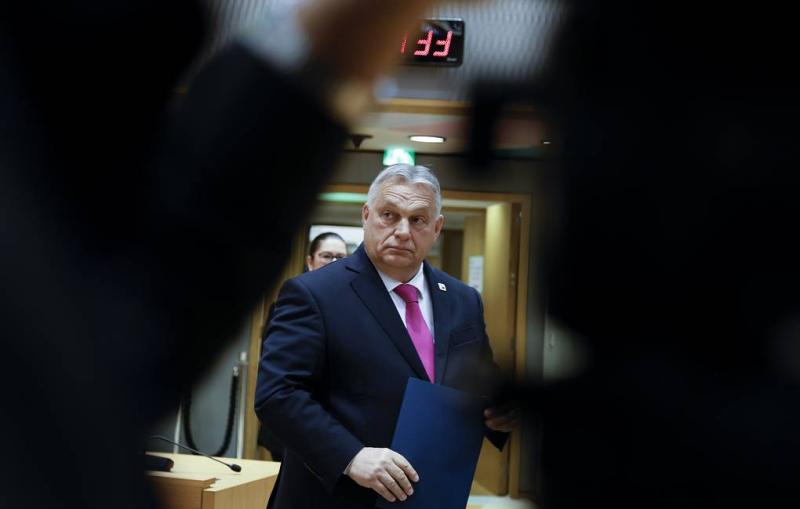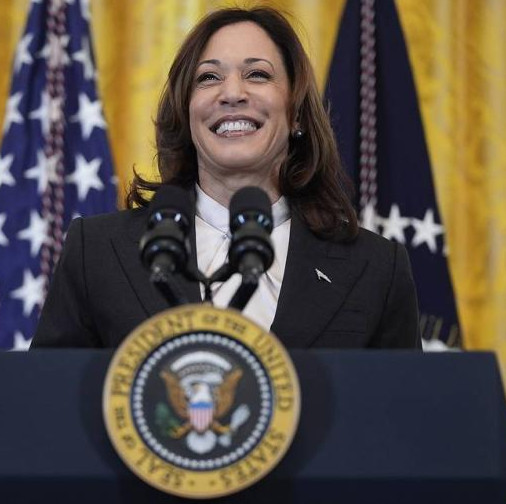
Hungarian Prime Minister Viktor Orban continues peace mission with trip to China; Ukraine's NATO future still up in the air; and US President Joe Biden fights for himself as Democratic candidate, says he is right man for the job. These stories topped Tuesday's newspaper headlines across Russia, according to TASS News Agency.
Hungarian Prime Minister Viktor Orban’s visit to China is unlikely to give a start to peace talks on Ukraine. However, experts tell Izvestia that they believe Orban's peace initiative could play a big role in facilitating peace if Donald Trump wins the US presidential election. On July 8, the Hungarian head of government discussed the settlement of the Ukrainian conflict with Chinese leader Xi Jinping, after which he immediately left for Washington for the upcoming NATO summit being held there.
According to Chinese media, the parties took a deep dive into what a peace deal on Ukraine might look like. Xi Jinping noted that Beijing and Budapest are aligned on this issue, both wanting an end to the fighting. The Chinese leader called on the international community to push Russia and Ukraine to come to the negotiating table and prevent the conflict from escalating further.
Orban’s negotiations with the leaders of Russia, China and Ukraine did not lead to any significant breakthroughs. Thus, Kiev stated that it does not support the Hungarian Prime Minister's ceasefire initiative for the sake of starting negotiations with Moscow. Russia, as Orban himself admitted, is also opposed to this idea, believing the Ukrainians could use any break in fighting to their advantage, restoring the combat effectiveness of their army.
Orban’s visit was criticized by many in the European Union, including an especially sharp rebuke from German Chancellor Olaf Scholz. Meanwhile, Head of the European Council Charles Michel reiterated that Hungary had no mandate to interact with Russia on behalf of the European Union.
Among European leaders, only Prime Minister of Slovakia Robert Fico openly welcomed Budapest's diplomatic efforts. Chinese economist Andrew Leung told Izvestia that the West is divided over continuing the war in Ukraine. He believes that Europe is growing increasingly wary of military support for Kiev. The expert also said that Ukraine fatigue is very real, and is growing in the United States.
Vladimir Bruter, expert at the International Institute for Humanitarian and Political Studies, believes that Hungary's peace initiatives will not succeed. However, after his visits to Russia and China, Viktor Orban may touch base with Donald Trump and his campaign team to give him the lay of the land.
Support for Ukraine and its Euro-Atlantic prospects will dominate the three-day NATO summit set to open on Tuesday, July 9, in Washington. The summit will be the first for NATO in its new composition, expanded this year to include Sweden, and the last for the alliance's current secretary general, Jens Stoltenberg, Nezavisimaya Gazeta writes. Hungarian Prime Minister Viktor Orban has added some intrigue to the discussions - before the summit, he visited Moscow and Beijing, where, according to him, he discussed the possibility of resuming negotiations between Ukraine and Russia.
One of the most pressing issues for NATO was resolved before the summit in Washington - the candidacy of the future Secretary General of the Alliance. It has already been agreed that in October, when Stoltenberg leaves his post, former Dutch Prime Minister Mark Rutte will take his place.
Also attending the summit will be President of Ukraine Vladimir Zelensky. Prior to the summit, the NATO leadership clearly outlined what Zelensky could and could not expect from the upcoming meetup. According to what Stoltenberg said at the pre-summit press conference in Washington, Ukraine will not receive a direct invitation or a road map to join the Alliance. However, Kiev will get a new aid package for 2025 worth 40 bln euro.
What is unlikely to be discussed are plans for a cessation of hostilities. On the eve of the summit, neither Stoltenberg nor any of the alliance leaders spoke about the need to start negotiations with Russia, Nezavisimaya Gazeta writes. The only exception is Orban. The Hungarian leader will arrive in Washington from Beijing, where on Monday he held talks with Chinese President Xi Jinping. The only thing that can be said with certainty, according to the newspaper, is that Orban will not deviate from his position on the Russian-Ukrainian conflict at the summit in Washington.
Vedomosti: Biden hits back at Dems who want him out of presidential race, defends candidacy
US President Joe Biden intends to stay in the presidential race, as follows from a letter he wrote to his fellow Democrats in Congress published by the New York Times on July 8. Biden is fighting for himself, doubling down on the message that he is the only candidate who can defeat Trump in the November election, Vedomosti writes.
The letter was published a few hours after Democrat and Minority Leader of the US House of Representatives Hakeem Jeffries met with leading members of the party in Congress. According to ABC News, four of them do not want Biden to run for a second term. At the same time, representatives from the president's campaign headquarters said the majority of the party still supports him and stressed their readiness to fight on.
The letter could influence Democrats who are calling for Biden to be replaced, Associate Professor with the American Studies Department at the School of International Relations of St. Petersburg State University Grigory Yarygin told Vedomosti. According to the expert, Biden's direct appeal as a heavyweight could at least prolong negotiations between his allies and opponents within the party. At the same time, he has a chance to win over critics who understand the image risks of replacing a nominee.
Biden has taken the party hostage, Head of the Center for North American Studies at IMEMO RAS Victoria Zhuravleva believes. The expert noted that the difficulties involved in replacing a candidate without his consent and Biden's stubbornness to stay in the race have the Democratic Party in a hopeless position. Replacing Biden is technically possible, but practically impossible, unless he himself steps aside. By choosing to stay, he essentially guarantees that the Democrats will lose the election, Zhuravleva concluded.
Izvestia: SCO working on unified payment system
The SCO is considering the possibility of creating a unified system of payments in national currencies, the organization's Deputy Secretary-General Janesh Kane told Izvestia. The issue is being discussed at various levels, but there are still a number of legal subtleties that must be worked out. Countries are also working to increase the share of mutual settlements in their currencies with Russia proposing its own payment and settlement mechanism. In addition, the SCO can learn from the experience of BRICS, which is working on launching the BRICS Bridge platform.
"The SCO countries want to use their national currencies for trade and investment purposes. This issue has been talked about at various levels for some time," Janesh Kane told the newspaper, adding that the countries are also working on increasing the share of mutual settlements in national currencies.
The growth of trade using national currencies for the development of joint projects is especially important amid sanctions. "Creating a payment infrastructure for mutual settlements in national currencies within the SCO is quite likely, since a number of countries are concerned about the precedent of Russia's disconnection from SWIFT and the freezing of Russian assets," Advisor to the president of the National Clearing Center, chairman of the Russian-Asian Business Council Maxim Kuznetsov told Izvestia.
BRICS, which includes four SCO members - Russia, China, India and Iran - has long and actively promoted settlements in national currencies. As Russian Deputy Finance Minister Ivan Chebeskov told Izvestia in late June, Moscow is also working with the BRICS central banks to launch the BRICS Bridge platform for payments in national currencies, including digital ones.
Vedomosti: How will France navigate political gridlock inside parliament?
According to the results of the second round of general elections in France on July 7, the country will have three major government coalitions. Moreover, for the first time since the establishment of the Fifth Republic in 1958, none of these political forces has a majority, Vedomosti writes. The New Popular Front, which won the most votes, will have 182 deputies in the 577-seat Chamber of Deputies. The pro-presidential alliance Ensemble, which came in second, won 168 seats. Finally, the right-wing coalition, led by the right-wing populist National Rally came in third with 143 seats.
In the first round on June 30, the National Rally took a solid lead and its formal leader Jordan Bardella publicly claimed the post of prime minister. But thanks to deals and maneuvers by supporters of President Emmanuel Macron, who removed more than 200 of their candidates to help the left, the hopes of Marine Le Pen's supporters to form a government will not be realized, Vedomosti writes.
Thus, none of the political coalitions participating in the early elections can claim a majority in the Chamber and will not be able to form a government on their own. As a result, French Prime Minister Gabriel Attal, who belongs to the pro-presidential coalition, announced his resignation after the polls were published late on July 7. But on July 8, AFP reported that Macron did not accept his resignation.
"Coexistence is a painful, uncomfortable but workable situation when parties are forced to look for common ground. But the current situation is different," Head of Sector Section for Regional Issues and Conflicts at IMEMO RAS Pavel Timofeev told Vedomosti. In his opinion, this is an unprecedented challenge for the institutions of the Fifth Republic as such, although this does not mean that it will degrade and will be reborn into the Sixth Republic.
According to Timofeev, Macron’s saving grace could be the formation of a minority government headed by Attal, with an agreement with the parties on "non-aggression" against him, or the creation of a "technical government" of experts who don't have ties to politics. He could then dissolve parliament in 2025 and call new elections. "In the latter case, it is quite possible to prevent a slide into crisis," Timofeev concludes.
TASS is not responsible for the material quoted in these press reviews









